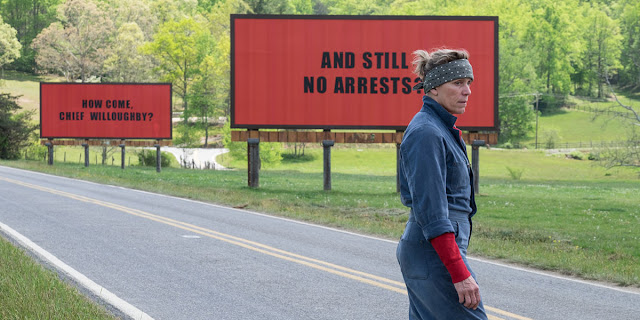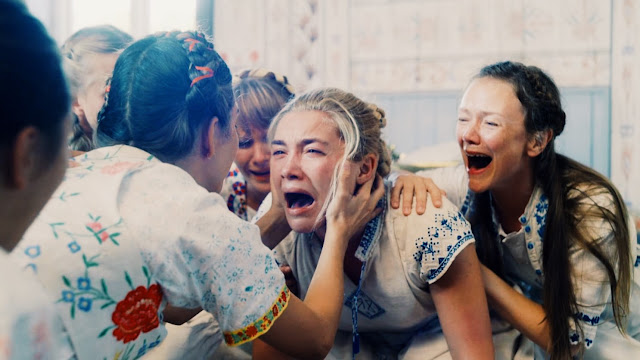Three Billboards Outside Ebbing, Missouri (2017)
"Hate begets hate; violence begets violence; toughness begets a greater toughness." - MLK Jr.
It is perhaps the most sentient lesson one can take from Three Billboards Outsie Ebbing, Missouri. The darkest film of 2017. A film so unrelentingly angry and brutal, that it laughs in self-awareness and asks the audience to do the same. Not a single person in this film is likable, by any stretch. Not a single line of dialogue is delivered with the premise of you bursting out laughing. Three Billboards is what it is. Unapologetically politically incorrect and gritty. Martin McDonagh piles it all on high like a plate at Thanksgiving dinner (to make a timely reference). But consequently, it gives the film a charm of it's own and a poignancy that is unmistakable. Reminiscent of the great films of the Coen Bros. and Quentin Tarantino, Three Billboards takes itself as far as it can go down the dark comedy rabbit hole and you will be smitten by that instantly. Three Billboards is a remarkable film and the most memorable film I've seen this year.
Frances McDormand, in what can only be described as her most commanding on-screen performance since Fargo, plays Mildred Hayes. The grieving, blisteringly vengeful mother of a young girl raped and murdered by an unknown psychopath. In righteous indignation, she rents out Three billboards, that just so happen to be outside of Ebbing, Missouri (as the title suggests), that bluntly criticize the police department of Ebbing for what she sees as incompetence. “Raped while dying,” “And still no arrests,” “How come, Chief Willoughby?” they read. Chief Willoughby, played by Woody Harrelson, takes offense by the billboards as he feels it unfairly targets him, especially coming on the heels of his cancer diagnosis. Backed up in outraged is Officer Jason Dixon, played by Sam Rockwell, in a role that seems tailor made for a young Michael Rooker . Officer Dixon is the world's stupidest cop and the most bigoted for sure. As time goes on, the outrage comes to ahead when a new specific tragedy (that I won't spoil) happens to Chief Willoughby. Defiant, Mildred insists that the billboards stay up. The tables have turned for Dixon, who now has a righteous anger of his own. Desperate for revenge, he tries to get back at Mildred, only to reap what he has sowed, by chance, in a Molotov cocktail attack on the police station. Also, by sheer chance, he runs into who he thinks is the killer of Mildred's daughter and to atone for his bad cops sins, tries his best to indite the SOB.
What is this movie getting at? A simple tale of the madness of current American society at it's core. Nobody is ever who they seem and we all aren't perfect. Also, how fate can change lives and the perspectives of themselves and others on a dime. Furthermore, tragedy and hate tend to become vicious cycles, as we all like to blame some kind of scapegoat to heal ourselves. It never does. Three Billboards cuts deep, even as it takes itself not very seriously... or so we think? The characters all curse up a storm and beat each other up, yet they all cry real tears. Can a film this strange make you feel the feels? The answer is it does. By some miracle, it does.





Comments
Post a Comment